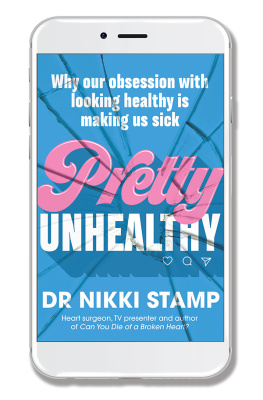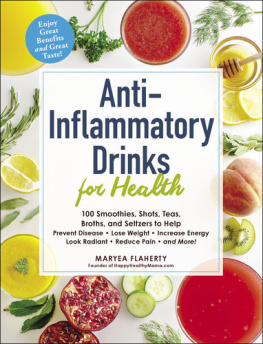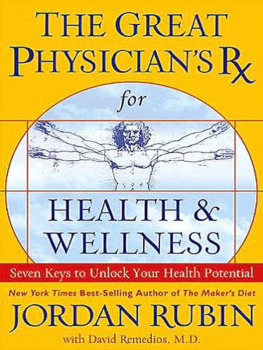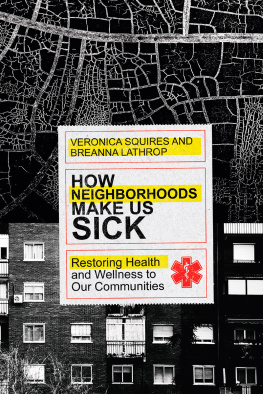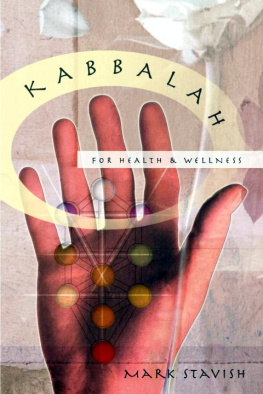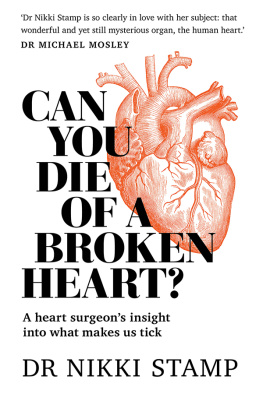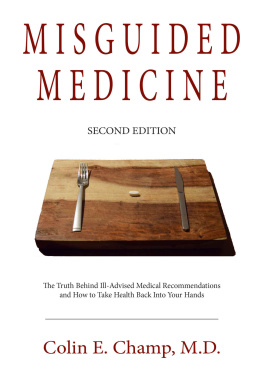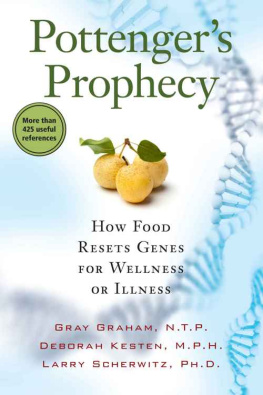
Dr Nikki Stamp FRACS is a cardiothoracic surgeon, one of only 11 female heart surgeons in Australia. Her clinical work is at the forefront of cardiothoracic surgery, including transplants and congenital heart disease. She has a particular interest in womens heart disease and how the medical system can better serve female patients. Nikki has hosted heart health episodes for Australias flagship science TV programme, Catalyst, as well as Operation Live, in which she commentated a live caesarean birth. Her first book, Can You Die of a Broken Heart?, has been translated into seven languages.
Published in 2019 by Murdoch Books,
an imprint of Allen & Unwin
Copyright Nikki Stamp 2019
All rights reserved. No part of this book may be reproduced or transmitted in any form or by any means, electronic or mechanical, including photocopying, recording or by any information storage and retrieval system, without prior permission in writing from the publisher. The Australian Copyright Act 1968 (the Act) allows a maximum of one chapter or 10 per cent of this book, whichever is the greater, to be photocopied by any educational institution for its educational purposes provided that the educational institution (or body that administers it) has given a remuneration notice to the Copyright Agency (Australia) under the Act.
Murdoch Books Australia
83 Alexander Street, Crows Nest NSW 2065
Phone: +61 (0)2 8425 0100
murdochbooks.com.au
Murdoch Books UK
Ormond House, 2627 Boswell Street, London WC1N 3JZ
Phone: +44 (0) 20 8785 5995
murdochbooks.co.uk

A catalogue record for this book is available from the British Library
ISBN 978 1 76052 454 8 Australia
ISBN 978 1 91163 234 4 UK
eISBN 978 1 76087 214 4
Cover design by Alissa Dinallo
Author photograph by Chris Chen
CONTENTS


The cuff tightened on my left arm. I could tell by how tight it was getting that the result was not going to be good. When it finally released, I looked at the numbers on the screen.
Shit. My blood pressure was way too high.
My doctor looked over his glasses and raised his eyebrows. He pressed the button again, hopefully to show us both that there was nothing wrong and that this ridiculously high blood pressure was just a mistake; a one-off.
After months and months of feeling so tired that I struggled to make it through most days, I had finally gone to see my doctor. For a long time, I had put it down to working too hard and burning the candle at both ends. I had finally reached a point where I couldnt stand the fatigue that I could feel in my bones; I decided to stop being a doctor who was dismissing all her symptoms and go and be a patient.
For the second time, the cuff around my arm released and made an audible sigh. And for the second time, the number was too high.
I cant really accuse you of having white coat hypertension, can I? he said, referring to the artificially high blood pressure people get when confronted with a doctor. I think we both assumed I would be immune to that, as a doctor myself. All I could do was give him a nervous laugh as he pressed the button again, hoping for third time lucky.
There was no such luck, and the numbers on the screen stared back at me accusingly. We decided that after months of high blood pressure something that runs in my family it was time for some treatment. I also had to have a battery of blood tests to check for other reasons why I might be so tired. I left his office clutching a prescription for a blood pressure medication; I also bought a home blood pressure monitor to check myself. I was, on the inside at least, a little ashamed and a little scared.
Just a few days after starting my tablets, I felt amazing. My blood pressure was much lower and I had so much energy. Rather than waking up every morning feeling like I hadnt slept at all for months, when my alarm went off I was bright and ready to face the day. I couldnt remember the last time I had felt so good. So healthy.
Outwardly, I blamed my newfound diagnosis squarely on my genetics. When my friends and colleagues marvelled that I was too young and looked far too healthy to have high blood pressure, let alone be on treatment for it, I blamed my dad. He has been treated for high blood pressure since his 20s. I laughed and said something along the lines of: You cant choose your parents.
Inwardly, I knew that this wasnt entirely fair. I knew that even with the genetic make-up for things like high blood pressure or heart disease, living a healthy lifestyle slashes your risk of actually developing the illness. I knew that I had really not been taking care of myself, letting my exercise lapse and eating foods that were easy and fast, but almost certainly not that healthy. I knew I was over-committed and over-stressed. But I had managed to hide these feelings and pretend that everything was fine. After all, I looked fine. It was an easy lie to get away with when the outside appearances hid the inside problems.
About a week after my doctors visit, I was in a changing room, trying on a dress in one of my favourite stores. I was cursing the fact that the room had no mirror and I needed to venture outside into the public eye to see if I looked any good. I hate doing that; I get self-conscious about what other people will see. I wanted to judge myself, my body and my appearance in private. As I wrestled with the zip at the back of the dress, my phone beeped with a message.
It read: Nikki, your fasting blood sugar is a bit high. I have added an HbA1c to check you dont have diabetes. Im sure its probably okay though. An HbA1c is a blood test that gives a picture of how high someones blood sugars have been over the past six weeks I know it well because I often order it for my own patients.
I felt the blood drain from my face. My head was filled with doctor thoughts, muddled with fear. Do I have diabetes? Maybe I dont have diabetes, just pre-diabetes... But, Nikki, thats also bad, I told myself.
The sales assistant yelled into the changing room: Going okay in there? No, I thought, I might have bloody diabetes. Surely not though. I looked down at the dress and ventured out to the communal mirror, my brain still going a million miles an hour to decipher what the hell was wrong with me. I stared at my reflection and the thoughts that came next were not good: I cant get diabetes. I cant be unhealthy; look, Im not even fat. This dress is a small. People who wear small size dresses cant have diabetes.
My more realistic (and harsher) brain kicked in: You know very well that is complete bullshit. Firstly, you are not fat, but that doesnt mean that you cant have diabetes or high blood pressure. Secondly, be honest: you have been taking really bad care of yourself, youre eating badly, youre not exercising and those few extra kilos youve gained, thats why were here. Small size or not, youre unhealthy. I felt like I was being told off, which I probably should have been.
The sales assistant must have assumed I was deep in thought over my dress, not weighing up in my head the risk of having a heart attack or mentally going through the exercise I had avoided in the last week. I bought the dress, maybe in an effort to prove that I am small and therefore worthwhile and definitely not sick, and scurried out of the shop.

